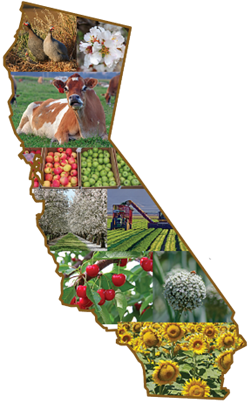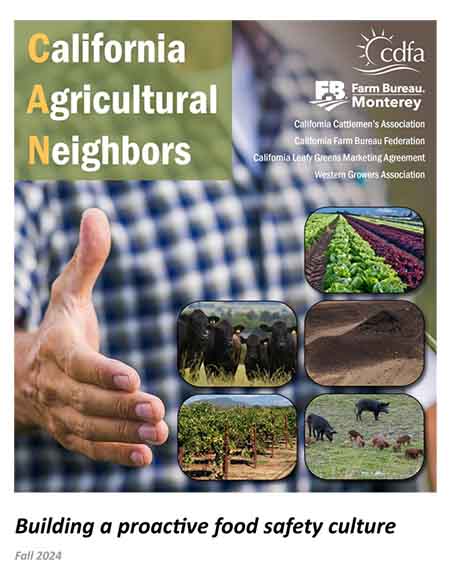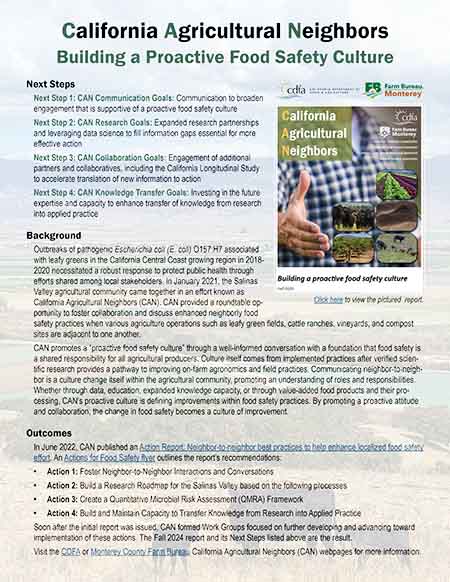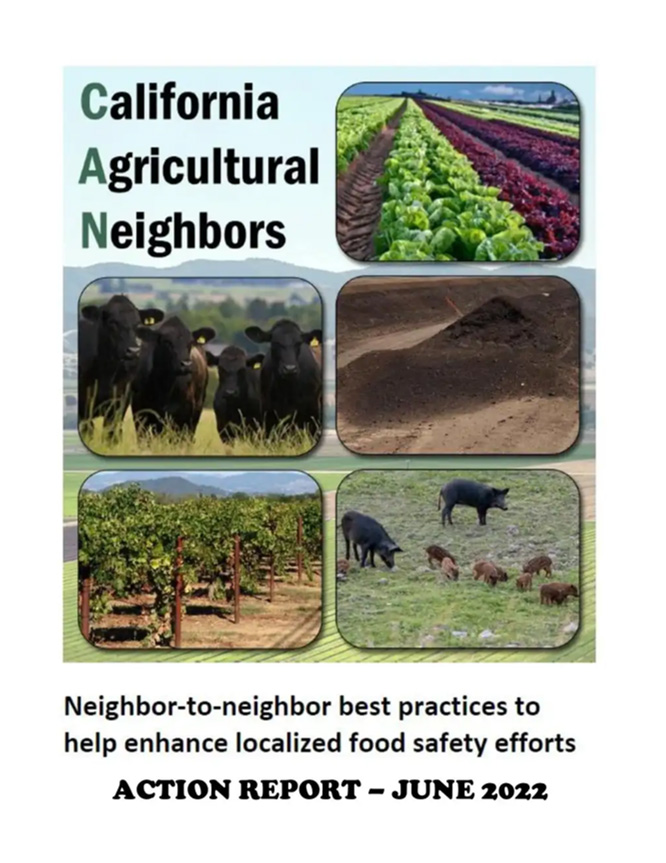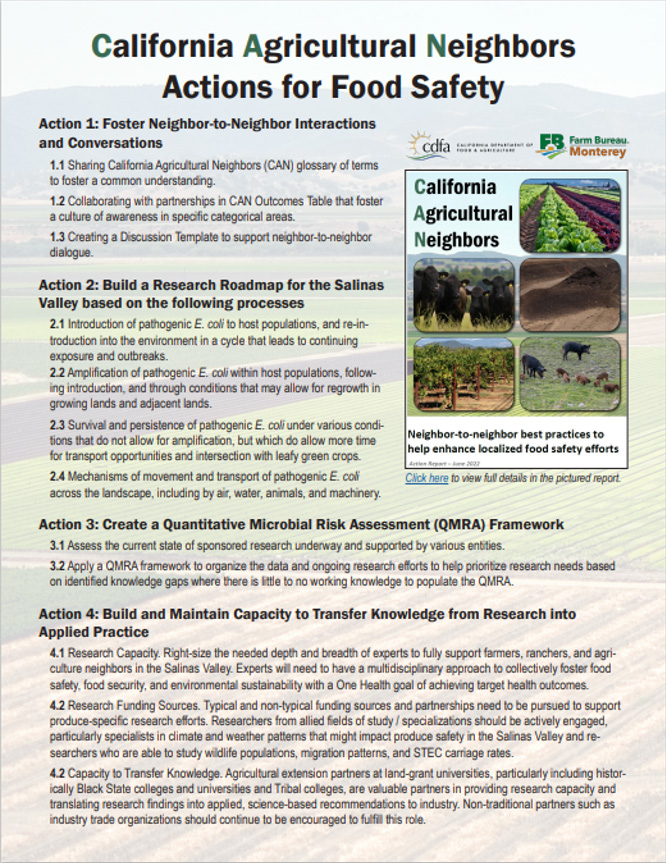Produce Safety One Health Initiatives
California Department of Food and Agriculture (CDFA) actions to enhance the safety of leafy greens include the launch of the California Longitudinal Study (CALS) in 2020 and California Agricultural Neighbors (CAN) in 2021. These actions were prompted following a series of E. coli O157:H7 outbreaks linked to leafy greens grown in the California coastal region between 2018 to 2020 and three investigative reports[1][2][3] issued by the U.S. Food and Drug Administration (FDA). CDFA initiated collaboration with FDA, industry associations, universities, and members of the produce, viticulture, livestock, and compost industries to initiate dialogues and actions plans to address knowledge gaps and foster enhanced produce safety practices.
Choose an item below to learn more about California's actions for enhanced leafy greens safety:
The California coastal region is a richly diversified agricultural environment that leads the country's production of leafy greens and several other fresh produce commodities. The research efforts taking place in California are based on the globally supported One Health approach. One Health is a collaborative, multidisciplinary, systems-thinking approach that recognizes the health of people is interconnected to the health of animals, plants, and our shared environments. The One Health approach is also a fundamental component of the national Healthy People initiative, which guides health promotion and disease prevention efforts to improve the health of the nation. Released by the U.S. Department of Health and Human Services (HHS) every decade since 1990, Healthy People identifies science-based objectives with targets to monitor progress, motivate, and focus action to improve public health. Healthy People 2030 (HP2030) is the latest release with objectives (of the Healthy People initiative) aimed in reducing Shiga toxin-producing E. coli risk in produce and leafy greens. Food safety is a shared responsibility and CDFA remains committed to enhanced produce safety efforts for Californians and beyond through active collaboration and engagement with regulatory, academia, and agricultural industries.
FDA Investigative Reports:
[2] FDA Publishes Report with Key Investigation Findings From 2019 Outbreaks Associated with Leafy Greens
[3] FDA Releases Investigation Report Following Fall 2020 Outbreak of E. coli O157:H7 Illnesses Linked to Leafy Greens
California Longitudinal Study (CALS)
The California Longitudinal Study (CALS) started in 2020 and is focused along California's coastal growing region. It represents one California effort aimed to adaptively address the outbreaks of E. coli O157:H7 associated with leafy green crops. To accomplish CALS, California's leafy green industry is collaborating with partners from California's cattle, viticulture, and compost industries, UC Davis Western Center for Food Safety, and state and federal partners. This approach serves as a model to:
- Offer an adaptive research strategy
- Perform research on a large geographic area to better understand underlying causes of contamination in the production environment
- Provide a scientific basis for recommendations
- Offer information that guides the development of practical preventive controls
- Assist in solution-oriented outcomes
The CALS effort should allow growers and affiliates in the agriculture industry to understand prevalence of human pathogens in and around leafy green crop growing environments. These data can bring awareness to leafy green growers and their farming systems and allow the industry to respond to that awareness with practices and measures that ultimately help prevent foodborne illness. The study enables sampling to be conducted in priority regions, with attention to seasonal/temporal changes. It also aims to provide an extensive data set to evaluate trends or changes over time, including metagenomics that may yield important clues to the changes taking place in the microbial community in response to the changing environment of the California coastal region.
California Agricultural Neighbors (CAN)
California Agricultural Neighbors (CAN) was established in 2021 in response to continued outbreaks of pathogenic Escherichia coli (E. coli) O157:H7 associated with leafy greens in the California coastal region. The California Department of Food and Agriculture (CDFA) and the Monterey County Farm Bureau (MCFB) have led efforts to foster collaboration and discussion to protect public health through efforts shared among the production, processing, retail industry, agricultural industry, and regulatory entities to address the following action items:
- Action 1: Foster Neighbor-to-Neighbor Interactions and Conversations
- Action 2: Build a Research Roadmap for the Salinas Valley
- Action 3: Create a Quantitative Microbial Risk Assessment (QMRA) Framework
- Action 4: Build and Maintain Capacity to Transfer Knowledge from Research into Applied Practice
CAN efforts are supported through the California Farm Bureau Federation, California Cattlemen's Association, Western Growers Association, and the Leafy Green Marketing Agreement to help with facilitation services provided by Abby Dilley, RESOLVE.
CAN was formed with three key goals in mind:
- Identify practices for agriculture neighbors that can potentially help enhance food safety and improve public health and trust.
- Document the broader challenges of the California regulatory landscape that impacts produce growers, cattle ranchers, vineyard managers, compost processors, and wildlife management differently, and that may result in regulatory silos with competing or conflicting demands with produce food safety practices.
- Develop accurate messaging to enhance education and adoption of continuously improving food safety practices founded in science, while acknowledging that simple neighborly courtesy measures of communication can have beneficial, lasting impacts.
CAN helped create the foundation for a food safety framework throughout California by enhancing communication among the agricultural communities through scientific insights and enhanced food safety education and action. CDFA and the Monterey County Farm Bureau announced the joint release of “California Agricultural Neighbors: Building a Proactive Food Safety Culture” in November 2024.


